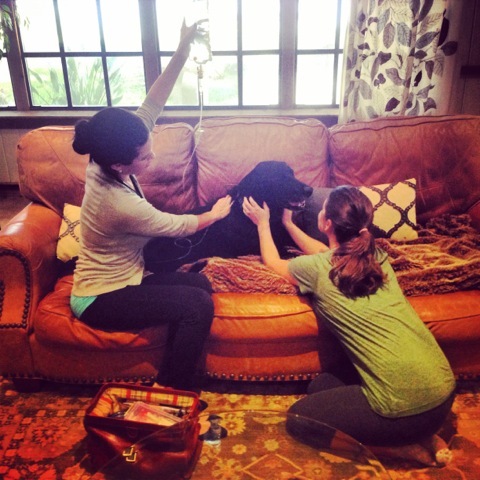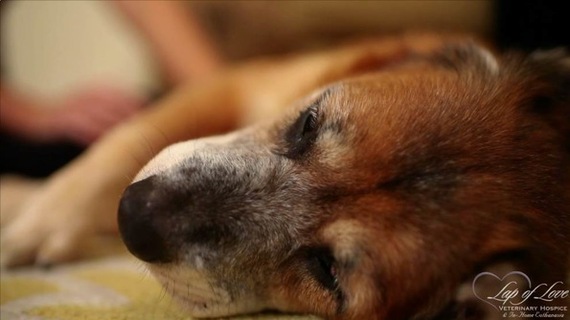Losing a pet is devastating, no matter how or when it happens. Whether an unexpected cancer, a disease, or an accident, it doesn't matter. Since pets rarely outlive their caregivers, this loss is something that unites everyone who has ever adored another species.
I've loved many pets and lost more than I'd have liked to. My resident matriarch, Whoopsie, is in her twilight years, and I routinely brace myself for her decline. Perhaps my preparedness is the last thing she'd ever wish on me, but I'm not sure how I will cope when she begins to wane.
While speaking to a friend and colleague in Los Angeles, Dr. Jeff Werber (DVM), the topic of aging pets and end-of-life care came up. He had been touched by an at-home euthanasia he'd recently performed and looked to me for help putting his feelings into words. I listened; then wondered if his sentiment was sparked by the fact that the caregiver, a known Hollywood actress, had been so close to her beloved dog?
"No," Jeff said, pausing. "I think it was her children." When he first arrived, they had tearfully begged for a reprieve. Even their mom, who had the charisma to sway Hollywood's elite, questioned her own powerlessness. Was there anything more that could be done?
"What I was able to help them see," Jeff explained, "is that euthanasia is really a gift when prolonged suffering is inevitable. It's a gift because the dog can be calm, at home, and surrounded by loved ones."
Then Jeff shared the real blessing of his story. Days later, he received a note from the children. On a thin sheet of white construction paper there was Honey, their dog, with angel's wings, floating above their home. The words coming out of her mouth were almost illegible in their child-like formation: "Thank You. I will love you forever."
Continuing, he reflected, "As my friend from Lap of Love Veterinary Hospice, Dr. Dani McVety says, death is not the opposite of life, it's the opposite of birth." Those words stopped me in my tracks.
"Death is not the opposite of life, it's the opposite of birth."
Whoa, that was really deep.
Though I'd heard of Lap of Love, I knew little about it. I asked Jeff to fill me in.
Lap of Love is the brainchild of Dr. Dani McVety. When studying her undergraduate degree in microbiology she took the sage advise from the book Don't Sweat the Small Stuff, by Richard Carlson and volunteered at a local hospice center. It was an life-changing experience.
Months after graduating veterinary school at the University of Florida, she embraced her life's calling by founding Lap of Love Veterinary Hospice, which has grown into a network of uniquely trained veterinarians, providing at home hospice care to aging or terminally ill pets. With their sights firmly focused on their animal patients, rather than their illness, they alleviate any end-of-life stress, from routine transportation and extended medical stays to painful suffering. Hospice veterinarians extend nurturing and non-judgmental relief to more than just their animal patients, however; they offer it to human clients as well. And should euthanasia be a chosen kindness, it is done at home, surrounded by loved ones.
Some of you may be wondering about the difference between routine pet care and hospice care. I know I did.
Veterinarians are, like medical professionals, sworn under oath to provide relief and preventative care to their patients. They treat all illnesses with determination and optimism. Your veterinarian will offer you the best medical care your money can buy, and often urge you to explore new and hopeful remedies.
Until very recently, however, if a pet animal were injured or had cancer, your options were limited. Now there is an astounding range of tests, exploratory surgeries, and procedures that can be done in the hopes of comforting a pet or prolonging their life. Chemotherapy, EKG's, MRI's, radiation therapy -- advanced medicine knows no species bounds!
The key phrase to recall here is "the best care your money can buy." Since there is no Medicare or Medicaid for pets (although some insurance does exist, the coverage is not as extensive), the cost of pet care falls directly on the owners.
So while your veterinarian is motivated to offer prevention remedies and treat illnesses, the procedures can get very costly.
And yet, as in human medical advancements, there are times these procedures can be effective and other times when they're not. In addition, if the procedure takes the pet out of his/her home, it gives pause to consider if the procedure is more stressful than the illness itself. On her site Dr. McVety reports that for animals, "fear or stress can be worse than pain."
Enter hospice. Hospice treatment accepts death as a part of life no matter what the species. Where your regular veterinarian might urge you to focus on treating an illness, a hospice veterinarian will not question your decision to forgo continued efforts. Your in home care-giver will help you to celebrate the bond of friendship, while providing medical guidance and comfort as they near the end of their time with you.
Knowing hospice exists for my pets gives me a happy relief, especially when I think of my Whoopsie. Rather than dread her aging, I feel hopeful that I can choose her care and prevent her suffering. "Death is not the opposite of life, it's the opposite of birth." Though I know that her time with me will never be long enough, I'm going to enjoy every moment of it.
Perhaps the greatest lesson of hospice care is to simply enjoy each other in the time that is gifted to share, and to prepare, one readying to shift into a new phase of existence -- death, while the other braces to be left behind.
Next up? Excerpts from conversations with the founder of Lap-of-Love, Dr. Dani McVety herself. Stay Tuned!

